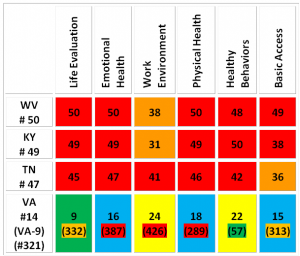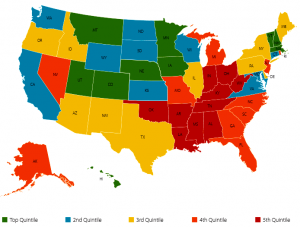Front Porch Blog
By Melanie Foley
Legislative Policy and Research Assistant, Summer 2013
Gallup and Healthways recently released their annual Well-Being Index for 2012, and Appalachia was found once again to be home to some of the least healthy and happy Americans. The most striking result of last year’s Well-Being Index is that while the happiest states are spread throughout the country, the lowest ranking states are all clustered in Central and Southern Appalachia, and the region’s neighboring states.
The Well-Being Index compiles surveys taken from all over the country all throughout the year and organizes them by state, community and congressional district. Participants are asked to evaluate their lives according to six categories:
– Life Evaluation: how a person’s current life compares with their expectations
– Emotional Health: deals with the respondent’s experiences and feelings on a given day
– Physical Health: encompasses diseases, physical pain, sick days, body-mass index, etc.
– Healthy Behavior: addresses both positive behaviors (e.g., exercise) and negative (e.g., smoking)
– Work Environment: questions for workers on job satisfaction, treatment from superiors, etc.
– Basic Access: includes access to food, housing, healthcare, etc.

West Virginia (50) and Kentucky (49) once again brought up the rear as the saddest two states for the fourth year in a row. Tennessee slid down a few pegs from its spot last year, joining its fellow Appalachian states at number 47. As a whole, Virginia did quite well. But the state’s congressional district data indicates a major well-being disparity. The 9th District of Virginia, shown in parentheses above, ranks 321st in well-being out of 436 congressional districts. Respondents from this southwestern Virginia district have more in common with their Appalachian neighbors than with affluent northern Virginians.
When people hear there is a state-by-state report on happiness, they want to know a few things. Who’s number one? It’s Hawaii. Who changed the most since last year? Alaska took a turn for the worse, and Delaware improved significantly. How did my state do? You can find out here. But anyone who looks at the map above is likely to wonder: why is that cluster of red states so unhappy?
Gallup and Healthways do not offer specific explanations for their results, but it is easy to see how a poor score in one category might correlate with others. Poor access to quality food and healthcare, for example, could lead to poor physical or emotional health. One Healthways researcher suggested lifestyle choices as a contributing factor, emphasizing the likelihood that different categories contribute to and compound on one another. Many potential explanations boil down a lack of adequate resources.
A couple weeks ago at Mountain Justice Spring Break, I met a woman from the town of Appalachia in southwest Virginia. She told me about the heyday of her town, when you had to walk in the street because the sidewalks were so packed with people going out to dinner or shopping or to the movies. Her descriptions were nothing like the ghost town surrounding me. The coal had run out, the mining companies had moved on, the shops had closed up, and most of the people had moved away. All that was left behind was the pollution and memories of a better time. The same has happened all over the Appalachian region — and it is still happening today, as more mountain communities are destroyed for a short-term payoff.
These poll results are just the latest reminder that the region’s long-standing, intractable economic difficulties have not been resolved. The most recent issue of The Appalachian Voice points out that half a century has passed since the creation of the Appalachian Regional Commission, but political and economic problems in the area still persist. It was in 1964 that President Lyndon B. Johnson lamented that “Appalachia missed out on the abundance which has been granted to the rest of the nation.” The same could easily be said today.
PREVIOUS
NEXT
Related News

Leave a comment
Your email address will not be published. Required fields are marked *


Your are correct! They are very confused at who and what has their best interest in mind! It DAMN sure aint the repubs.
The idiot in appalachia make their own troubles by voting for republicans. I have no sympathy.